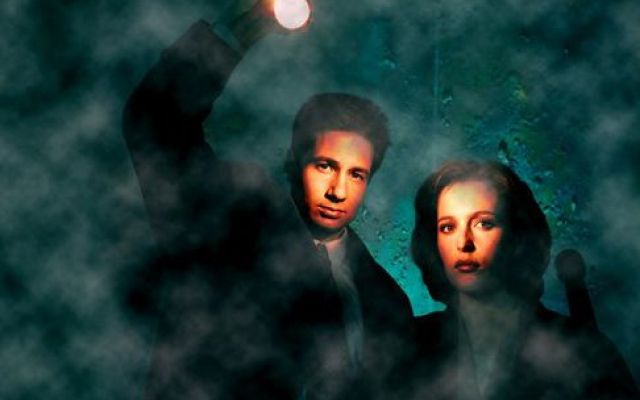On Flashlights and Wanting to Believe
Jill Reid
 As I write this piece, in part, out of fondness for my pre-Internet childhood and an old love affair with a boxy and rabbit-eared television, I can see us. We are sitting rapt – my two little sisters cross-legged beside me, our faces iridescently lit by the FBI flashlights that spear the dark glaze of an eerie and abandoned field. I can see Mulder and Scully pushing the light forward, toward us as we lean into it, intersecting one another like the glowing crossbeams of their flashlights.
As I write this piece, in part, out of fondness for my pre-Internet childhood and an old love affair with a boxy and rabbit-eared television, I can see us. We are sitting rapt – my two little sisters cross-legged beside me, our faces iridescently lit by the FBI flashlights that spear the dark glaze of an eerie and abandoned field. I can see Mulder and Scully pushing the light forward, toward us as we lean into it, intersecting one another like the glowing crossbeams of their flashlights.
I have forgotten many things about being a child, but piercingly clear is the part of my childhood and adolescence spent watching The X-Files. I remember the metallic smell of the antenna in my hands as I worked toward the delicate arrangement that would render a clear screen. I remember the big bowl of popcorn and pushing through angst and fear to deliciously tremble week after week as Fox Mulder and Dana Scully dodged monsters and aliens, their faces tense with the work of believing and proving what no one else could.
And it was worth it – the increased fear of a dark room, the occasional nightmare about spaceships or shape-shifters. It was worth it because as Mulder famously told us and as the opening credits stated week after anticipated week, “the truth is out there.”
Having grown up in the world of faith, in belief in the humanly impossible—in arks and Ascension and water into wine—I didn’t find Mulder’s words hard to accept. My whole world was informed by the supernatural, by the persistent grip of redemption and grace and by what I couldn’t always see and couldn’t always touch. I cheered for Mulder’s tenacious desire to uncover truth, for his skeptic partner Dana Scully’s increasing ability to begin to believe with him, too. And as they struggled with the paranormal, I sensed how faith in what couldn’t be seen or touched could become the foundation against which all the experiences of my life, even the frightening and unexplainable ones, were contextualized and illuminated. I even saved money to buy an expensive flashlight that I told myself was for reading beneath my bed covers. Really, I think I wanted it to illuminate my dark room the way Mulder and Scully’s search illuminated the space between me and the television on nights The X-Files came on.
One day, The X-Files went off the air. Soon after, I went to college. And I only kept a flashlight inside the glove-box of my car on the chance I had a flat tire and not because I anticipated a situation that involved the goose-bump pull of a dark field. Somewhere, in my movement through the long corridor of my twenties and early thirties, the unexplainable became too easy to explain with despair and disillusionment. Time has a way of relieving us of our wonder and expectation, of dimming our flashlights and making darkness seem more commonplace than even the simplest light. After the usual bouts with time that produced deaths and divorces and friends moving across the world, it was the joy that baffled me, the surprise that someone I loved did not die or divorce or move far away.
A few months ago, it was announced that David Duchovny and Gillian Anderson were going to revive my old friends, Mulder and Scully, for six new episodes. In honor of the show’s new season, I began re-watching the old episodes. And I was surprised at how completely I had forgotten about the unbelief. And I’m not talking about Dana Scully, the skeptic to Fox Mulder’s persistent enthusiasm. I’m talking about Mulder, whose energy of faith was its own kind of light in the dreariest and most hopeless of circumstances: “It’s hard, Scully,” he said. “Distrusting everyone and everything—it wears you down. You even begin to doubt what you know is the truth.” Stunned, I thought about how his words articulated a disillusionment buried in my own movement away from wonder. I understood what Mulder meant: the work of belief can be exhausting.
The revival of one of my favorite series has reminded me of the longing, of the unquenchable desire that is the human struggle to believe. Tonight, another episode will air. The flashlights will glimmer into focus. Mulder and Scully will reappear across my living room. And if they, years later and in middle age, can still be pulled into the fray of search and hope, if they can still be compelled to ready their flashlights and hit the dark and eerie fields, I can, too. Maybe I will call my sisters, remind them to turn on their TVs, and pop a bowl of popcorn. Perhaps, at the first sound of the theme-song’s whistle, I will become 14 again—a total nerd, a total dreamer, a total fan of the insatiable human capacity for belief that relies both on the resilience of imagination and the mystery of faith and that resurrects itself into the most unsuspecting life when she has forgotten to believe resurrection can happen.